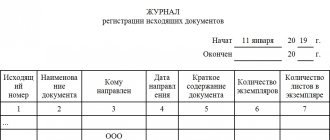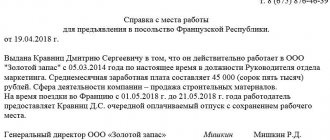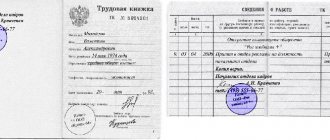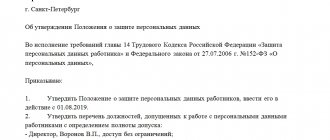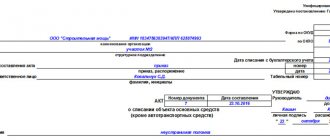Company managers sometimes have to involve workers in overtime work. This may be due to a force majeure situation, inventory taking, failure to meet the production plan and other reasons. But some employers may have a question: how to properly document this, since the employee has already worked a shift and has the right to rest?
Overtime work is regulated by the provisions of Art. 99 Labor Code of the Russian Federation. This article states that the employer has the right to involve a hired employee in processing only after receiving his written consent. That is, to do this, the employee must write an application for overtime work, a sample of which we will provide below.
In what situations is it necessary to write a statement and when can you do without it?
To get an answer to this question, we must again turn to Art. 99 Labor Code of the Russian Federation. The employee's written consent will be required in the following cases:
- when there is an urgent need to complete work that has been started, but which was not completed in a timely manner due to an unforeseen delay (if failure to complete the work will lead to the loss of property or create a threat to people’s lives);
- to carry out repairs and restoration of equipment or structures (if a malfunction puts many employees out of work);
- when one of the employees did not come to work and there was a need to replace him (if the work does not allow a break).
In what cases is it not necessary to obtain the employee’s consent?
Part 3 of Article 99 of the Labor Code of the Russian Federation determines that if certain situations arise, the employer has the right to mobilize its employees to work overtime without obtaining their consent. A closed list of such circumstances looks like this:
- preventing an industrial accident or disaster;
- eliminating the consequences of a disaster, industrial accident or natural disaster;
- elimination of unforeseen circumstances that disrupt the normal functioning of centralized hot, cold water supply or sewerage systems, gas, heat supply, lighting, transport, communications systems;
- declaration of a state of emergency or martial law;
- carrying out urgent work in emergency situations (fires, floods, famine, earthquakes, epidemics or epizootics).
In these cases, you cannot refuse overtime work and you do not need to fill out a consent form.
What is a claim for overtime?
An application for overtime work is a document expressing the consent of a specific employee to perform work functions after hours, on weekends or holidays. The application is drawn up in the name of the employer (head of the organization). The document can be written by hand or typed on a computer.
The sequence of actions will be as follows:
- the employer notifies the employee that there is a need to carry out work activities outside the duration of the established work shift or schedule;
- the employee writes an application for overtime, in which he expresses his consent to work outside of normal hours, and submits it to the employer for approval;
- the employer issues an order to involve the employee in overtime activities.
To confirm his consent to off-hour work, the employee does not have to write a separate statement. It is enough to put your signature opposite the line “I agree” in the notice of engagement in overtime work drawn up by the employer.
The employer must understand: if an employee refuses to stay after work or go to work on his day off, he does not have the right to force him to work overtime. It is also unacceptable to apply administrative penalties to an employee just because he decided to refuse to work outside of normal working hours.
Procedure for applying the document
Overtime work is formalized in the company with documents such as an internal memo about its necessity and an order to engage in overtime work.
The Labor Code of the Russian Federation strictly defines cases when it is necessary to obtain the employee’s consent before drawing up this order.
These include:
- Carrying out urgent repairs of equipment to ensure future activities;
- Absenteeism or lateness of a shift worker to ensure business continuity;
- To complete the work started, if its termination results in loss of property or there is a possibility of harm to the life and health of people.
In addition, for some workers, obtaining consent to such work must also be accompanied by notification of the possibility of refusing it, and sometimes obtaining a medical certificate for such activities.
This may include vulnerable workers, disabled employees, as well as workers who are single parents caring for disabled children or other family members in need of supervision.
The text of consent to overtime work can be included in the notice of engagement in such activities. Then this document must be drawn up in two copies so that the employee can record his answer on company letterhead.
It is advisable to also include in the agreement the employee’s choice when determining compensation. After all, the Labor Code of the Russian Federation establishes payment for this time either at an increased rate, or providing additional rest, but not less than the hours worked overtime.
Attention! In some situations, consent to
overtime work
no need to compose. Such cases include: preventing or eliminating the consequences of accidents, catastrophes, emergencies, imposing martial law, for the restoration of socially necessary infrastructures.
How to write an application
The application form is not approved at the legislative level, so it is drawn up in any form. The contents of the document are also not regulated by any legal acts. But there are still certain details that the employee must indicate in the application. Such details include:
- name of the legal entity, full name manager;
- FULL NAME. and employee position;
- date and place of involvement in overtime work, its duration;
- Date of preparation;
- employee signature.
Approximate structure of the application:
- "A cap". Here indicate the position of the manager, the name of the organization, position and full name. the employee who made the application.
- Title of the document (“Application”).
- Next, you must indicate that the employee agrees to work overtime. For example: “I, Igor Petrovich Bykov, agree to be required to work overtime on April 18, 2020 from 6 to 10 p.m. due to a breakdown of the production line.”
- After the text of the application, the employee puts the date of writing, signature and transcript of the signature.
The employer must put a resolution on the application. The sample application for watch recycling presented below can be used as a basis when writing a similar application.
I couldn’t find it on the site, if there is a link, please share it. So far I have come up with this to the Chief Accountant of LLC From the store manager STATEMENT P I ask you to pay me for overtime for the period from 10/13/2009-07/31/2012, I agree with Articles 4,91,99,152 of the Labor Code of the Russian Federation The number of working hours per week should not exceed more than 40 hours. All hours worked in excess of the norm are considered overtime and are subject to double payment. The duration of overtime work should not exceed 4 hours for each employee for two days in a row and 120 hours per year. Overtime work is paid for the first two hours of work at least one and a half times, for subsequent hours - at least double. Date signature And the situation is the following - the company was sold and we are moving to a new legal entity. Previously, overtime was paid only upon dismissal and to those who insisted (usually they threatened to contact the labor inspectorate), but now we are fired, and then accepted into a new company And all overtime is burned, we are talking about 70-120 thousand. Tomorrow it will be To resolve this issue at a meeting, a competent statement is needed. I'm waiting for your comments. Thank you
>Application for payment of overtime hours - sample
How to write a letter about recycling
Info
So, if the average hourly earnings is 200 rubles, then during this time you need to pay 300 rubles for every 60 minutes;
- Subsequent times will be charged at double rate.
However, the summarized system is such that it will be almost impossible to calculate the first couple of hours for each day, so payment is made in double amount.
Sample memo about processing working hours
When clarifying the grounds for additional payments, it is necessary to prepare a memo. It will become the basis for the issuance of an appropriate order by management.
And this order, in turn, will serve as a command for the accounting department to transfer additional funds. The document must be based on the law and correctly drawn up.
In this case, it is sent to the enterprise’s corporate email. The secretary is responsible for further sorting and forwarding of letters to recipients.
This method of transferring SZ saves paper and employee time.
Attention
In this case, the document is drawn up in the same way as on paper. It is advisable that it bears the electronic signature of the sender.
To make sure that the sent document has been read by the manager, when sending, you should request a “mail read receipt” by checking the box on the sending form.
Important
An employee performs the duties of another employee (specialist), payment for such additional work is in the amount of the absentee’s salary or an additional payment based on the difference in salaries.
- Combination. In addition to his own duties, the employee also performs the work of the absentee.
Management sets the amount of the surcharge as a specific amount or as a percentage of the monthly salary.
- Increasing service area. Distribution of work among several employees.
- For two hours, one and a half times the income is paid.
IMPORTANT! Substitution or combination is established within the established working hours according to the Labor Code.
The SZ is drawn up by the employee in the name of his immediate supervisor or in the name of the head of another department.
The standard rule of double remuneration for such work applies. All this is subject to accounting and reflection in the work time sheet.
Overtime recorded in labor records will definitely become the basis for additional payments. In this case, it is necessary to distinguish between entering the service at the initiative of the employer or for personal reasons.
Only exit at the direction of the employer can be considered overtime. This can be issued in the form of an order or instruction. Such documents mean that it is necessary to perform your functions outside of working hours.
And on weekdays, work for 9 or 10 hours a day will become a reason for increased pay only after adding these figures at the end of the accounting period.
After all, 10 hours of labor on one day are fully subject to compensation of 4 on another. Therefore, with this system it is impossible to make a conclusion every day.
Payment occurs according to general rules.
Regardless of the reason, the calculation of funds due for disbursement is carried out as follows:
In practice, the manager records his decision in the form of a visa on the memo itself, on the basis of which an order is then issued.
An approximate sample of this document can be viewed at the link: Sample memo for payment of overtime hours.
https://youtu.be/_gsX6uYIJMU
Companies have the opportunity to enter and use many different forms of written communication about any incidents or issues of an organizational and financial nature that require the intervention of senior management. But a unified memo template is not established by law, but it must comply with the requirements of GOST 6.
- name of the organization or structural unit, indication of the person to whom the appeal is sent;
- document's name;
- text - what needs to be communicated to management;
- date, signature and necessarily the position of the author.
We have determined the mandatory requirements, now let’s look at an example of how to write a memo.
Example 1
This type of arrangement of details in a document is called angular. But they can be placed on the sheet in other ways.
Example 2
The picture shows the longitudinal placement of the details. And both options will be correct.
There is a third option.
Example 3
But even if it is customary for your company to prepare documents in a completely different way, do not worry, this is also correct, since officials did not provide for a mandatory form.
What is an overtime claim?
In a general sense, an application for overtime hours, a sample you will find below, means a written document of consent to work overtime. At the same time, in the same form, the employee can indicate a request for payment of earnings for overtime. Why is this document being compiled?
In accordance with the norms of stat. 99 of the Labor Code, an employer can use overtime work of personnel only with his consent (written) in the following situations:
- To complete work already started earlier, which for various reasons (for example, technical) could not be completed within the usual time frame.
- To perform temporary repair work if a malfunction that is not corrected in time will result in the suspension of work for a significant number of personnel.
- To replace a specialist who did not show up, if the activity is of a continuous nature.
In some situations, the employer does not need the specialist’s consent to overtime. Such cases are usually associated with emergencies, force majeure, emergency or martial law. In addition, certain categories of employees are strictly prohibited from being involved in overtime, even with their consent. And other individuals (women with children under 3 years old, disabled people) can only be involved with consent.
Payment for overtime hours on a shift schedule
How to make an application for payment for processing - sample
Therefore, in order to justify the need for staff rework, it would be optimal for the employer to have a statement from the employee. Such a document is always filled out in writing, in any form. The employee personally indicates that he does not object to overtime and indicates a request for payment of the due remuneration.
What information must be included in the application? The full name and position of the employer's manager, full name and position of the specialist must be provided. Further, the citizen explains that he does not object to being involved in overtime work and indicates the exact time of overtime. Additionally, you should include a reason to justify the overtime. If an employee has the right to refuse overtime, it is necessary to add a proposal to inform the employer.
Application for overtime work - sample
to CEO
Digital Systems LLC
Smirnov Anatoly Nikolaevich
from a retail store salesperson
Chernova Elena Alexandrovna
Statement
I, Elena Aleksandrovna Chernova, agree to work overtime for 4 hours on June 14, 2020 from 17.00 to 21.00 due to the need to replace the employee Andrey Sergeevich Semenov who did not show up.
I have been informed by the employer of the right to refuse to engage in overtime work on the basis of stat. 99 of the Labor Code of the Russian Federation, since I am raising a child aged 2 years.
I ask you to pay for overtime hours in the amount established by the Regulations on the remuneration of Digital Systems LLC.
06/14/2018 ______________ /Chernova E.A./
If you find an error, please select a piece of text and press Ctrl+Enter.
Overtime: concept, types of compensation
Art. 99 of the Labor Code of the Russian Federation dated December 30, 2001 No. 197-FZ (hereinafter referred to as the Labor Code of the Russian Federation) gives the concept of overtime work. This is the work to which the employer engages the employee after the end of his daily work shift or, if cumulative accounting of working hours is used, in excess of the allotted number of hours for the accounting period.
IMPORTANT! In order for overtime to be considered overtime, the employer's initiative is required. An employee who performs overtime without the knowledge of the employer and on his own initiative cannot claim compensation for work beyond the established time (see the decision of the Pugachevsky District Court of the Saratov Region dated November 30, 2016 in case No. 2-934(1) 2016, letter from Rostrud dated 02.12.2009 No. 3567-6-1).
Overtime pay is a state-guaranteed right of every employee working in conditions that differ from normal ones. This compensation, as Art. 152 of the Labor Code of the Russian Federation, may consist of:
You can find more complete information on the topic in ConsultantPlus. Full and free access to the system for 2 days.
- monetary remuneration: for the first 2 hours of overtime, the employee receives one and a half times the payment, and for subsequent hours - double;
- providing time off, the duration of which must be equal to or greater than the number of overtime hours.
In what cases is it written?
In companies with a small number of employees and established trusting relationships between the boss and his subordinates, the need to write an application for time off disappears. All agreements are made verbally and are not notarized.
However, in large enterprises with a large workforce, it is difficult to keep track of everyone.
If an employee goes to work on his day off according to a standardized schedule and subsequently receives the right to not attend the workplace in proportion to the overtime hours worked, then he must formally submit an application for time off for the time previously worked.
This is worth doing so that this opportunity is not lost after a certain amount of time (the boss may forget about overworking one of his employees due to the large number of subordinates).
The general rule proclaimed in Labor legislation is the prohibition of working on weekends and non-working holidays.
At the moment, a new procedure has been established for attracting workers outside normal hours. In all cases, an employee’s involvement in work on non-legal days can only take place with his written consent.
Examples of situations that allow processing:
- Entering the workplace to complete urgent work;
- Elimination of the consequences of any accidents in the workplace;
- Exit due to replacement of an absent employee;
- Going on a business trip on non-working days or holidays.
You can also request time off:
- on account of vacation - an example of an application;
- at your own expense - a sample application;
- for performing the functions of a donor - .
How to properly file an overtime invoice?
All applications for time off have a standard form (skeleton) and are only slightly adjusted depending on the reason for the time off taken.
- In the upper right corner, the first line is the position of the chief. Below is the company name and full name. leader. All words are indicated in the Dative case.
EXAMPLE:
to CEO
LLC "Dental Clinic "Kedr"
Ivanov Ivan Ivanovich
- Below the information about the manager, the word “from” is written, and the position and full name are indicated. employee in the Genitive case.
EXAMPLE:
From a pediatric therapist
Kozlov Mikhail Mikhailovich
- After all the designations, the word “Statement” is printed below and in the center of the sheet.
- The text of the statement itself is written directly with approximate content:
“Please give me a day off from work on “__” _______ 20___ for the time previously worked. Overtime work occurred on “__” _______ 20___ due to my replacing an absent employee.”
- Date the application was created.
- Applicant's signature.
applications for time off on account of previously worked overtime – word.
Sample writing for working on a weekend or holiday
If it happened that an employee urgently needed to visit his workplace on a weekend or holiday, and subsequently decided to take time off for these hours worked, then he should know about the peculiarities of writing an application.
The “header” - that is, all the contact information in the upper right corner of the sheet - remains the same regardless of any possible nuances.
In the “skeleton” - that is, in the main content of the application, it is necessary to indicate the desired day of absence from work and the reason why the boss should provide this pass.
After writing the application, it is transferred to the company’s accounting department, and then submitted to the head of the enterprise for signature.
The application becomes valid only from the moment the manager’s signature appears on it. The time for submitting it must be calculated so that the general director has time to consider it.
In addition, if it is not possible to provide the employee with time off at the time specified in the application, the manager has the right to offer to transfer it to another date or to compensate for everything in cash.
applications for time off for working on a public holiday - word.
For performing duties while on vacation
An employee can compensate for his time spent in connection with going to work and performing duties on the day of vacation either by extending the current (subsequent) vacation, or by receiving days off, which the employee can manage independently.
Depending on the decision made, different options for events will be determined.
If a subordinate takes time off, the application for him will take a standard form.
When extending leave, it is necessary to make amendments to the timesheet, which can be done in the company’s accounting department or by contacting the general director of the enterprise directly.
For work on a business trip
It happens that urgent business trips fall on the employee’s standard weekend or non-working holidays. It is much easier to get your legal rest under such circumstances than under others, for example, those described above, since going on a business trip is accompanied by an order and the right to time off in case of unforeseen funny situations can be officially proven.
To submit an application, you must attach, together with the sheet itself, a package of administrative documents for going on a business trip on certain days, as well as a standardized work schedule.
applications for time off for work on a business trip – word.
Features of providing time off for overtime
{amp}gt;
settlements with personnel {amp}gt; Providing time off for overtime work The legislation of the Russian Federation clearly regulates the procedure for providing working citizens with time off for overtime work. The accounting of overtime and the procedure for providing appropriate compensation are under special control.
https://youtu.be/ZCrBq_XTZRY
Exceeding the maximum established norm is strictly prohibited. In case of overtime, a company employee should be given the choice of receiving time off or increased pay for previously worked time.
| Dear readers! The article describes typical situations, but each case is unique. If you want to find out how to solve your particular problem, use the online consultant form in the lower right corner of the site or call direct numbers ext. 445 - Moscow - CALL 7 (812) 426-14 -07 ext.394 – St. Petersburg – CALL here – if you live in another region. It’s fast and free! |
How much is overtime paid?
Each employee who has worked hours in excess of the norm has the right to receive time off - time off with a duration equal to the hours or days worked overtime.
Time off can also be granted for working on a weekend or holiday - details here.
Reasons for overtime
The need for overtime work may arise in 2 cases.
- At the initiative of management. In this case, processing is possible only with the written consent of the employee. In addition, it is necessary to have such documents as a corresponding order and official confirmation of the fact of overtime work.
- At the employee's initiative. An employee of any company can stay late at work for various reasons. Among these, the most common is considered to be failure to deliver an urgent project. It is important to take into account that the company’s management is not obliged to pay for additional working hours.
In addition, the need for processing may arise due to the absence of a key employee, as well as repair and restoration work.
In order to eliminate the possibility of misunderstandings when determining overtime, the following information should be displayed in the company’s local documentation:
- rules for involving employees in overtime;
- a list of positions and types of work that can be performed overtime;
- the procedure for calculating pay and granting time off for previously worked time.
The procedure for granting time off due to overtime has a number of features. In this case, special attention is paid to the preparation of relevant documentation. The following are considered the mandatory stages of registering overtime work and subsequently granting time off for it:
- Issuance of an order. It must contain information about the need to perform job duties on an overtime basis;
- Coordination of the order with the employee. If he agrees with the contents of the document, the employee leaves his signature on it;
- Reflection of the fact of overtime in the work period report card;
- Providing the employee with information about overtime. After this, he decides to choose the type of compensation - to receive monetary compensation or time off;
- Providing time off, if chosen by the employee. The employer does not have the right to persuade an employee to take time off; the decision is made by the worker independently. Registration of time off for previously worked time is carried out after the employee draws up a corresponding application issued in the name of the head of the company.
After receiving approval from management, the employee is given a day off. Its duration must be exactly equal to the hours or days of overtime worked, unless otherwise stated in local documents.
Time off for time previously worked is not subject to payment, provided that single pay is received for the overtime worked as for regular hours of work.
For working overtime, in addition to time off, the employee may be provided with monetary compensation. Its amount depends on the form of remuneration established at the enterprise.
There are several varieties of it:
- salary. In this case, the citizen is paid a single payment for processing;
- time-bonus system, in which wages are calculated according to the KTU. In this scenario, time off cannot be compensated by monetary compensation;
- piecework. As in the previous case, no compensation is paid.
The current legislation of the Russian Federation establishes a standard working time. Detailed information regarding this topic is set out in Article 91 of the Labor Code of the Russian Federation. The norm is approved annually and is indicated in the production calendar. In accordance with this document, the amounts of quarterly payments, as well as daily, weekly and monthly wages are determined.
The immediate procedure for calculating monetary compensation for overtime work is specified in Article 152 of the Labor Code of the Russian Federation. It displays information about the possibility of providing employees with time off or additional pay for overtime hours worked.
There are jobs that can be performed during overtime only after obtaining written consent from an employee of the enterprise. Employees may be required to be involved in processing if the following situations arise:
- liquidation of the accident;
- elimination of consequences after damage to utility networks;
- fire;
- disaster;
- prevention of negative circumstances of various types.
https://youtu.be/EhaydyO7pjI
It is important to take into account that not all categories of working citizens can be involved in working overtime. The exceptions are:
- minor employees;
- pregnant women;
- parents of young children;
- employees undergoing training at the company;
- citizens for whom overtime work is contraindicated for health reasons.
Involving overtime employees included in the list of exceptions may threaten the company's management with an administrative fine.
Question 1: I worked 4 hours overtime, how much rest should I be given?
Answer: The employer must provide time off no less than the overtime worked. In this case, the minimum rest time is 4 hours. At the request of the employer or in accordance with the local act of the company, this time can be increased.
Question 2: Management puts me on 1 day of leave for accrued 8 hours of overtime. Is this legal? I want to receive additional payment.
Answer: The employer does not have the right to influence the employee’s decision regarding the type of compensation - time off or money. The decision is made by the employee; if it is time off, then a statement must be written.
Question 3: Is it necessary to withhold personal income tax from payment of time off provided for overtime?
Answer: If the time off is paid, then income tax in the amount of 13% must be withheld from the payment, as with any other type of employee income.
Question 4: The employer personally issued an order to compensate overtime with time off, but the employee wants to receive cash payment. If an employee does not pay monetary compensation for more than 15 days, can the employee suspend work? The employer does not refuse compensation, but offers it in the form of time off.
Answer: The employee must decide for himself what type of compensation he needs. If an employee wants money, but the employer does not pay it, then after 15 days of delay, work can be suspended by notifying management in writing. It does not matter that the employer does not refuse to compensate for overtime by offering time off.
Ask your question
{amp}gt; Labor Law {amp}gt; Vacation {amp}gt; Time off {amp}gt; When it is legal to demand time off for overtime - important subtleties in providing it under the Labor Code of the Russian Federation
Time off is an additional day off granted to an employee either by agreement with management or for previously worked overtime.
Hours and days of overtime can either be paid at an increased rate or compensated for through additional time off. The features of providing time off for previously worked hours are discussed in the article.
Depending on the current legislation, the issue of the need to provide time off is resolved through dialogue between the employer and his employee.
But there are certain categories of employees who, regardless of the employer’s desire, have the right to get a day off. In particular, this includes cases of overtime, when an employee performs overtime work after completing standard working hours.
For each overtime hour worked, the employee is entitled to an hour of rest time. That is, the number of days off provided must be proportional to the time previously worked in excess of the norm.
Providing rest for overtime is regulated by Article 153 of the Labor Code of the Russian Federation.
Time off for previously worked hours can be provided only at the request of the employee; if he does not want to, the employer cannot oblige him. The initiative in this matter must come from the worker.
Time off may also be granted in connection with:
- marriage;
- death of a relative;
- the birth of a child;
- donation.
Other reasons that fall into the category of family circumstances are not mandatory for providing days off.
The Labor Code of the Russian Federation does not contain clear limited deadlines for providing time off for overworked hours. Therefore, the employee has the right to demand them not only in the month in which overtime work was recorded, but also in subsequent months.
A request for time off must always be made in writing; verbal form is not acceptable in this case.
According to the law, overtime as compensation for time must be provided for a period no less than that which was worked overtime; excess compensation is allowed. Example: Employee A.
worked 13 hours overtime during one work week, but her work schedule provides for a 40-hour week. To calculate time in whole days, you need to divide 13 hours by standard 8, which gives you one full day and 5 hours.
The law allows the employee to be given 2 days off, as well as to divide the compensation into parts, using both monetary and intangible ones.
conclusions
To summarize, we can highlight the main information:
- If certain situations arise that require a particular employee to work overtime, his or her written consent must be obtained.
- An employee who has worked overtime has the right to demand a cash equivalent or an additional day off.
- When writing an application, you must indicate the date, month and year in which the overtime work occurred. It is also worth noting the date of the desired time off. If possible, the application should be supported by administrative documents.
According to the legislation of the Russian Federation, any work must be paid.
What to do if the employer demands to work more? Will additional work hours be paid?
The article discusses the main aspects of receiving payment for overtime work.
What is "overtime"?
Additional working hours according to the Labor Code of the Russian Federation (Article 99) are considered to be the following hours:
- spent on work at the initiative of the employer;
- beyond the working period established by the company.
If the initiative comes from the employee, then these additional hours are not considered overtime.
In accordance with the Labor Code of the Russian Federation (Article 91 and Article 99), the normal working period is considered to be 40 hours per week, and additional hours should not exceed 4 hours in 2 days and 120 hours in 1 year.
It is important to take into account that there are persons for whom working hours are reduced:
- citizens 14-18 years old (24-35 hours);
- disabled people of groups I and II (up to 35 hours);
- people whose working conditions are classified as 3rd or 4th degree of danger (up to 36 hours);
- women working in the Far North;
- medical staff;
- teaching staff.
For the categories listed above, additional paid hours will be considered time exceeding the established limits.
In what cases can employees be required to work overtime?
As noted above, all work that employees perform in excess of the norm in a shift is overtime. Employees can be involved in such work in the following cases:
- if emergency or emergency situations arise that affect the work of the company;
- if emergency or emergency situations have arisen that affect the interests of a wider range of people;
- if the employer decides that overtime work is necessary.
Any overtime work must be limited in time. So, on the basis of Art. 99 of the Labor Code of the Russian Federation, overtime work should not exceed 4 hours within 2 days and 120 hours in total per year. In this case, it will not matter for what reason workers are called to work overtime.
Important! An employee can be engaged to work overtime only after obtaining his consent. Exceptions are emergency situations (99 Labor Code of the Russian Federation).
| ★ Best-selling book “Accounting from scratch” for dummies (understand how to do accounting in 72 hours) > 8,000 books purchased |
Who cannot be involved in additional work?
According to the above, pregnant women and persons under 18 years of age cannot be involved in overtime work.
However, there are exceptions to this rule:
- people of creative professions (Article 268 of the Labor Code of the Russian Federation);
- athletes (Article 348.8 of the Labor Code of the Russian Federation);
- persons working under an apprenticeship contract (Article 203 of the Labor Code of the Russian Federation);
- employees with certain medical conditions.
Admission to overtime work hours can be obtained either with or without the consent of the employee. This will be discussed below.
What documents does the employer require?
In each individual situation, there must be a document that is drawn up to confirm overtime work.
Moreover, there is no single form; it is developed by each organization individually.
The document must include:
- the reason for providing unscheduled work hours;
- date of work and its duration;
- right of refusal;
- agreement to perform overtime tasks;
- payment for additional labor.
Next, 3 possible types of documents will be considered.
Management order
This is an official document drawn up in free form.
It should indicate the following points:
- reason for overtime work;
- date and duration of possible processing;
- list of persons indicating personal data and positions;
- documents confirming employees’ consent to additional hours of work (their details);
- amount of surcharge;
- form of compensation;
- employee signatures.
If an employee who is familiar with this order (and who signed it) does not perform the work, a penalty can be issued against him in the amount established in the Labor Code of the Russian Federation.
Service memo
This document is an alternative to an order, but it is more often used by those departments that keep a log of labor hours.
The memo indicates the same points as in the order.
Notification
A notice is an alternative to a memo. It briefly approves an employee for a certain type of work.
He is obliged to sign and complete the work, after which the number of hours worked is reflected on the notice, and the paper itself is certified by the employer.
How to prepare a statement from an employee?
As a rule, when a case is considered in court, many workers cannot receive compensation due to the lack of official documents.
Therefore, the handwritten submission of an application confirming the employee’s consent to additional work is the main guarantee in resolving any legal claim.
Depending on the internal rules of the organization, the employee can write this statement by hand in any form or fill out a special form.
In this case, be sure to indicate the following information:
- Full name and position;
- reason, start date and duration of work;
- confirmation of consent to additional work;
- date and signature.
Such statements are kept by employees of the company's HR department.
Documents for download (free)
- Sample application for payment of overtime hours
Memo for payment of overtime hours - sample
The memo in this case is an optional document from the point of view of law, and the registration of engaging an employee to work above the norm can be done without it. However, in some organizations the need for its preparation may be enshrined in internal regulations - in regulations on office work or other acts.
The purpose of the memo is to convey to the company management the need to involve the employee in overtime work. In the future, this document will simplify the documentation of such attraction and payment of compensation.
Considering that the law does not provide for its form, the memo is prepared in free form or according to the model established by the internal regulations of the organization. It is recommended to include in its content:
- the position of the manager to whom the memo is sent;
- the position of the person who draws up the memo, the name of his department;
- justification of the reasons why it is necessary to involve the organization’s employees in processing;
- Full name of such employees, their positions;
- the date when it is necessary to engage in overtime work.
The document is transferred to the manager, who makes a decision on whether to engage in work or to refuse such engagement. In practice, the manager records his decision in the form of a visa on the memo itself, on the basis of which an order is then issued.
An approximate sample of this document can be viewed at the link: Sample memo for payment of overtime hours.
What are the risks?
In order to avoid wasting unnecessary funds, money and nerves, every citizen should remember that in a rule-of-law state it is important to have officially certified documents.
In their absence, it is difficult to prove anything in court. It is for this reason that many workers are left without overtime compensation.
And most importantly: each employee must have with him a copy of the application confirming his agreement with overtime work, and one of the documents (order, memo or notice).
If the rights of certain categories of citizens (people under 18 years of age and pregnant women) are violated, the victims should file a corresponding claim in court.
The methods of payment for overtime work in various organizations are described in the video.
Inadequate documentation of processing: risks for workers
In the absence of the above documents, it will be difficult to prove the fact of processing, and therefore it is the employee who is interested in ensuring that his employer prepares all the necessary papers. In their absence, the employee, of course, will be able to go to court and prove his claims. However, it should be borne in mind that not all documents, in the opinion of the judicial authorities, will clearly indicate overtime workload. They will not confirm processing:
- documents independently prepared by the plaintiff in free form (see the Appeal ruling of the Moscow City Court dated November 22, 2013 in case No. 11-36040/2013);
- a time sheet signed by the plaintiff, who has the appropriate authority to do so;
- testimony of citizens who are not employees of the defendant (see the decision of the Vologda City Court dated December 26, 2012 in case No. 2-12063/12);
- carrying out overtime work by verbal agreement with management;
- testimony of employees of the counterparty organization in the absence of confirming data that they performed the work with the knowledge and consent of the employer (see the Appeal ruling of the Moscow City Court dated August 22, 2012 in case No. 1-17928\12).
It is worth noting that in other situations, the testimony of witnesses is accepted together with written evidence (see the decision of the Rakityansky District Court of the Belgorod Region dated May 20, 2013 in case No. 2-91/2013).
***
To summarize, it should be noted that the main documents for payment of overtime work are an order from the employer, a time sheet with information about overtime entered, and the employee’s consent. And to pay for processing, the same accounting sheet and management order will be important. Additional information about payment for overtime can be obtained from the article “How is payment for overtime hours made?”
Statement of claim for recovery of arrears of wages for overtime work
IN
Plaintiff:
Respondent:
In accordance with the order of the head of N, I was hired for the position. According to the terms of the employment contract N, I have a daily working week, start time, end time, with a salary of rubles. per month. From to in accordance with Art. 99 of the Labor Code of the Russian Federation (hereinafter referred to as the Labor Code of the Russian Federation), I was repeatedly involved in overtime work. This fact can be confirmed. However, in violation of current legislation and despite my repeated requests, the employer has not yet paid me wages for overtime work. By virtue of Art. 152 of the Labor Code of the Russian Federation, overtime work is paid for the first two hours of work at least one and a half times the rate, for subsequent hours - at least double the rate. Also according to Art. 236 of the Labor Code of the Russian Federation, if the employer violates the established deadline for payment of wages, vacation pay, dismissal payments and (or) other payments due to the employee, the employer is obliged to pay them with interest (monetary compensation) in the amount of not less than one three hundredth of the current amount at that time refinancing rates of the Central Bank of the Russian Federation from amounts not paid on time for each day of delay starting from the next day after the established payment deadline until the day of actual settlement inclusive. In accordance with the calculation attached to the statement of claim, the current arrears of wages for overtime work are rubles, interest (monetary compensation) according to the currently valid refinancing rate is rubles. Also, the Plenum of the Supreme Court in paragraph 63 of Resolution No. 2 of March 17, 2004 “On the application by the courts of the Russian Federation of the Labor Code of the Russian Federation” explains that since the Labor Code of the Russian Federation does not contain any restrictions for compensation for moral damage in other cases violation of the labor rights of employees, the court, by virtue of Article 21 (paragraph fourteen of part one) and 237 of the Code, has the right to satisfy the employee’s demand for compensation for moral damage caused to him by any unlawful actions or inaction of the employer, including in case of violation of his property rights (for example, when delay in payment of wages). Taking into account the nature of the moral suffering caused to me by my employer, expressed in non-payment of funds that I was going to spend, I consider it possible to recover rubles from the defendant. for compensation for moral damage. Based on the above, guided by Articles 99, 152, 236, 237 of the Labor Code of the Russian Federation, I ask: 1. To collect from the benefit arrears of wages in the amount of rubles. behind . 2. To recover interest for the delay in payment of wages in the amount of rubles. 3. To recover compensation for moral damages for the delay in payment of wages in the amount of rubles.
Appendix: 1. Calculation of wage arrears and interest for delayed payment of wages. 2. A copy of the employment contract. 3. A copy of the work book. 4. . 5. Power of attorney or other documents confirming authority to sign the statement of claim.
Back to list
Related topics:
- Application to OBEP, sample Accounting and legal services The basis for the work of OBEP employees is a large amount of documentation of a legal nature,…
- Application to the BTI, sample Obtaining data from the technical inventory bureau Documents from the BTI include: a plan for each floor...
- Sample application for TIN How to fill out an application for TIN form 2.2-accounting - form and sample for downloading July 6...
Memo regarding additional payment to employees for overtime work
A list of employees who are not entitled to bonuses is also compiled. In order for an employee to receive a bonus for his work, let’s look at step-by-step instructions on how this happens at the enterprise: First, internal regulatory documentation is developed, which sets out all the information related to rewards:
- frequency of payments;
- payment terms;
- sources of bonus payments.
- amounts – fixed or percentage;
- nature of payments - one-time or permanent;
- reasons for bonuses;
It is likely that calculating quantitative indicators of the work performed by an employee takes time, so bonuses are often paid in the month following the work performed or at the end of the quarter.
In addition to the memo, the text compiled in it must be accompanied by documents confirming the justification for the bonus; the following groups can be distinguished: There is a unified form for bonuses (T-11), it is not mandatory, it is advisory in nature.
- Update: June 29, 2020
- The employee has the right to refuse overtime work: The employee must inform this category of persons about the right to refuse, against their signature.
- You cannot work beyond normal:
- pregnant employees;
- workers under 18 years of age (except for some creative workers and athletes);
- employees during the term of the apprenticeship contract;
- to other employees when this is not permitted by law (for example, due to medical contraindications).
We invite you to familiarize yourself with the appeal against a court decision: drafting, sample and procedure for filing in 2020
The first thing an employer needs to do is obtain consent from the employee to work beyond the norm. It is compiled in free form. Next, you need to issue an order on overtime work (we will provide a sample in the article).
There is no unified form for this order, so the employer draws it up independently. The order specifies:
- reason for attraction;
- work start date,
- position, full name of the employee;
- information about the employee’s consent.
This business correspondence tool is especially popular in companies where there are many departments at different levels and it is quite difficult to control everything. But even in small enterprises people are often interested in how to write a memo correctly; The content of such a report depends on the purpose for which it is compiled.
The need to write it arises if it is necessary to get a reaction to any extraordinary events. In addition, they write not only about the bad: they also make rational proposals for improving the work of the enterprise. When drawing up a “service”, follow certain rules, which will be discussed below.
Any employee has the right to write a service letter. Usually there are always two parts. In the first, management is notified of any fact or incident, and in the second, requests, proposals, and any other requests from the employee to a superior colleague are contained.
It’s worth taking hold of the handle if:
- violations were committed that caused any unforeseen actions or that could lead to them;
- management intervention is necessary, for example, there are not enough material and technical resources to complete a project;
- one of the employees did not show up for work or showed up under the influence of drugs/toxic/alcohol;
- there was a proposal to reward certain employees for outstanding results or other achievements;
- it is necessary to send someone on a business trip;
- it is required to call the employee back from vacation or a legal day off;
- any other situation on which a decision cannot be made without a leader.
The service report can serve as proof of the fact that the employee responded properly to the problem he discovered in the enterprise’s activities. Drawing up a report is not a right, but a responsibility of a specific specialist. It confirms the fact that the employee was not inactive, but took the necessary measures: he informed his superiors and promptly made decisions on the problem.
The basis for processing documents for additional payment may be for various reasons, for example:
- The need to increase output and the associated increased volume of work.
- Temporary absence of an employee due to illness or vacation.
- Changing the technology of a production process that requires additional labor costs.
- Expansion of the service sector due to production needs.
According to Art.

